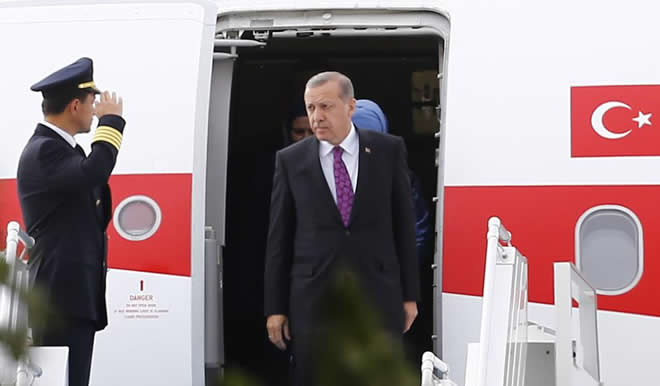
by Ed Husain
Wednesday, June 10, 2015
The ruling party in Turkey expected to win a majority in the latest parliamentary elections. For 13 years, under the iron grip of Recep Tayyip Erdogan, the AK Party has been the unstoppable force in Turkish politics.
This weekend’s result was a blow to the president of Turkey, but excellent news for democracy in Turkey and beyond. What happens in Turkey does not stay there: This election has consequences for the Muslim world.
Turkey has proved to the other countries that there is no contradiction in being an observant Muslim and a democrat, countering the Islamism seen elsewhere. This is a vital example to fellow states struggling to balance Islam with democracy.
The West brings its historical baggage when approaching popular political parties with strong ideologies and charismatic leaders. Too often, we think of 1933, when Hitler took full legal power in Germany and then cited extraordinary circumstances to prevent further elections.
That fear is, indeed, justified. Hamas in Gaza won elections in 2005 and has yet to hold them again. Egypt’s Mohammed Morsi took power in 2012 and then very quickly became dismissive of and disrespectful toward his opposition. To most politicians in the Middle East, democracy means majoritarianism—using the ballot box to secure rights for the majority.
Until this weekend, Turkey and its president seemed to be on that trajectory. After being a successful prime minister for three terms, growing his country’s economy, it was time for him to retire. Instead, he changed the country’s laws, allowing himself to become president, and is now seeking to change the laws again to create an executive presidency.
I understand Erdogan’s fears of quitting power. A friend of mine, a British member of Parliament, put it best when he said to me, “In the U.K., when our politicians lose office, they head to the House of Lords. In Turkey and the Muslim world generally, they fear being put in prison under fabricated charges by the new government.”
Erdogan’s success as a center-right, conservative, free-market politician means he has created many enemies on the left in Turkey. But at his core, he is a religious man in a very religious Middle East.
His ultra-secular critics cannot fathom his success in office. They expected him to fail, but he almost tripled Turkey’s GDP per capita to around $11,000 in less than a decade. A pious politician who embraced American-style capitalism, while maneuvering to the presidency like Russia’s Vladimir Putin, even in loss offers several important lessons for the Middle East and the wider Muslim world.
First, Turkey was the home of the Muslim caliphate for centuries. Turks, as well as the AK Party in particular, still feel a strong sense of responsibility for the plight of fellow Muslims around the world. This deep religious and emotional bond led to Prime Minister Ahmet Davutoglu name-checking Myanmar, Syria, Palestine and the Balkans on three separate occasions in his speech conceding defeat at the AKP headquarters in Ankara.
The AKP sees itself as the older brother of other struggling Muslim nations. How it behaves matters to other Muslim political parties. If they cried foul, demanding a recount, alleged voter fraud, their supporters turned violent and the military returned on the streets, then the signal to others would be that Islam-inspired political parties cannot handle defeat. What did not happen is as important as what did happen.
Second, it is a mistake to describe the AKP as “Islamist.” By its own definition, and its close proximity to European conservative parties across the continent, it is a Muslim conservative party. Neither Erdogan nor Davutoglu have called for the introduction of Sharia as state law, but have repeated their commitment to Turkey’s secular constitution.
It was Erdogan in 2011 who toured the Arab world after the Arab Spring emphasizing the importance of a secular and pluralist constitution. Then he was chased out of town in Egypt by Islamists and held in suspicion in Tunisia.
It was argued that as a winner he could endorse democracy and secularism, but would his party do so as losers? That answer is now loud and clear. There is no contradiction being an observant Muslim and a democrat. Turkey’s AKP has delivered this message in victory and defeat.
Third, Islamism as a political ideology, the message of the Muslim Brotherhood of Egypt, the Arab world’s largest country, needs to change.
In Tunisia, the Ennahda party is actively looking to adopt the Turkish AKP’s free-market message and experiences in government. They want to become conservatives, be seen as such and stop identifying as Islamists. To do so, democracy, the rule of law, property rights and governing through elected representatives become paramount.
Good behavior when losing elections is as important as when winning. Davutoglu’s repeated commitment to democracy rams home this point.
Finally, for us in the West, we have to understand and accept that there is a battle of ideas raging across the Middle East. We have very few perfect allies.
As Turks voted and put democracy on display, our Saudi allies upheld their decision to publicly lash a blogger for starting a liberal blog. Egypt has gone backward toward the military being in command of the country.
In a democracy, it is civilians who are supreme. Our armed forces are subordinate to elected representatives. Turkey, with all its flaws, is actively democratizing and should become our ally of choice. This election was an important milestone in that direction and deserves our support.
Ed Husain is a senior adviser at the Tony Blair Faith Foundation and adjunct senior fellow for Middle Eastern Studies at the Council on Foreign Relations. This article originally appeared on ReligionAndGeopolitics.org